|
CONSERVATIVE
PARTY UK
ABOUT
- A-Z INDEX - CONTACTS -
FOUNDATION - HOME -
REGISTER
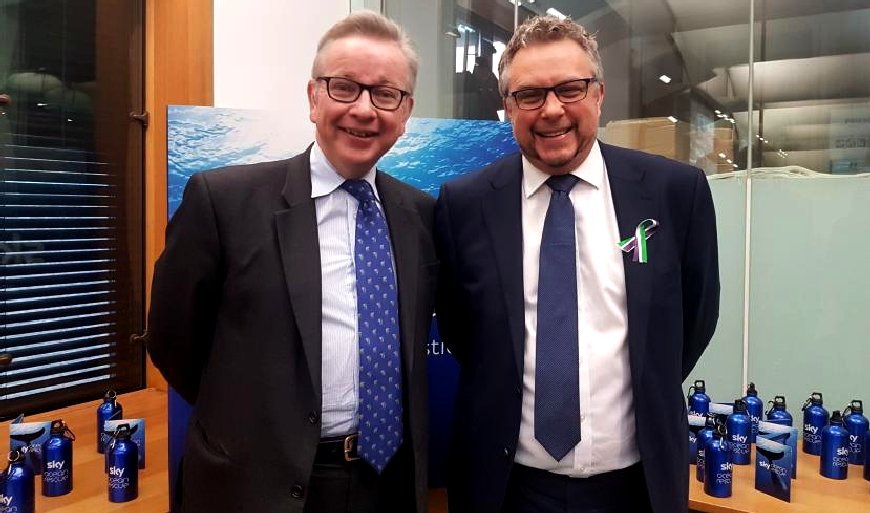
OCEAN
ACTIVISTS
- Michael Gove and Steve Double with Sky Ocean Rescue
products - hopefully not a polymer in sight.
There
are quite a few political contenders for the Miss Ocean title,
now including Theresa
May, but there are also a number of men in the running for
Mister Ocean 2019. These include Michael Gove and Steve
Double, two Conservative
MPs who are putting their money where their mouth is and
actually trying to make a difference.
SKY NEWS 6 FEBRUARY 2018
MPs will pledge to cut their use of single-use plastics in order to lead by example in tackling pollution in the world's oceans.
Parliamentarians will make a commitment to reduce the use of items such as plastic straws and plastic cutlery in their daily lives.
The problem of plastic pollution will be brought home to MPs by the arrival of Plasticus, the Sky Ocean Rescue
whale, outside Parliament.
Made up of a quarter of a ton of plastic, Plasticus represents the amount of plastic that enters the world's oceans every second.
By making a #PassOnPlastic pledge with Sky Ocean Rescue, MPs will be joining celebrities such as model Cara Delevingne and TV presenter Ben Fogle in making a commitment to reduce
single-use
plastic.
Offering his backing, Environment Secretary Michael Gove said: "Plastic has no place in our oceans, and I wholeheartedly support the work Sky's Ocean Rescue campaign has done to put this issue in the hearts and minds of the public.
"We have already introduced one of the world's toughest bans on
microbeads and removed nine billion carrier bags from circulation, and through our ambitious 25 year plan for the environment I am determined we further crack down on the scourge of plastic choking our oceans."
A year on, 65% say they use fewer than three plastic disposable bottles per week.
Earlier this month, Mr Gove handed out reusable coffee cups to his Cabinet colleagues after ministers, including the Environment Secretary himself, came under scrutiny for carrying disposable cups.
Mr Gove has also described the idea of a "latte levy" on disposable
coffee cups as an "exciting idea" in efforts to help the environment.
It follows suggestions Parliament could soon become "plastic-free" under plans being considered by officials.
A committee of MPs is reviewing the use of disposable plastics in the House of Commons and is expected to publish a report next month.
It was recently revealed more than a million disposable coffee cups and lids were used by the House of Commons last year.
Plastic straws, stirrers, condiment sachets, plastic cutlery and disposable water bottles were also bought in vast quantities.
It sparked calls for Parliament to get its "house in order".
The Speaker of the House of Commons, John Bercow, said: "I am delighted to support
Sky Ocean Rescue and I welcome the move by MPs to reduce their single-use plastic consumption to protect our oceans.
"This is a critical environmental issue and I hope we will be able to further reduce single-use
plastic waste throughout the Palace of Westminster in the future."
Launched in January last year, Sky Ocean Rescue aims to highlight the issue of plastic pollution and inspire people to help tackle the problem.
Sky became the first FTSE
100 company to commit to becoming free of single-use plastics by 2020, including for packaging for new products.
Jeremy Darroch, Sky Group's chief executive officer, hailed 2018 as "the year to turn off the single-use plastic tap".
"It's great to see MPs leading by example and encouraging others to make a change for the better," he said.
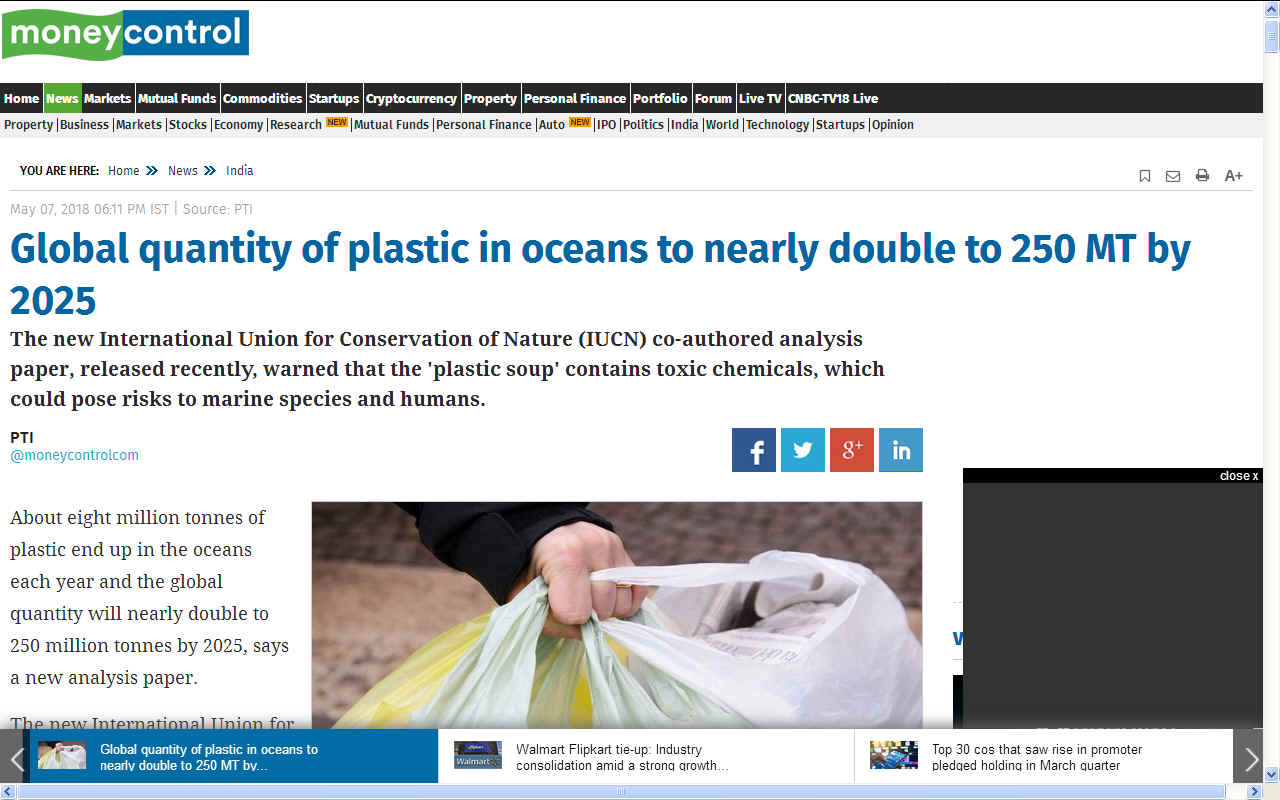
250
TONS BY 2025 - Not that long ago hardly anyone knew about
plastic in our oceans. The Global Ocean Commission virtually
said that there was no cure in making no recommendations. But
now, with Sir
David Attenborough and Blue
Planet II quite a lot of the shoppers and the voting
public are aware of the problem.
DAILY
EXPRESS APRIL 2018
Plastic drinking straws, drink stirrers and cotton buds are to be banned in the war on pollution, the Government
signaled last night.
The move, part of Theresa May's drive to combat the menace of disposal plastics fouling the world's oceans, follows research showing 8.5billion plastic straws are thrown away in Britain every year.
Environment Secretary Michael Gove yesterday announced a Government consultation on the proposal to mark the start of the Commonwealth Heads of Government Meeting in
London.
He also unveiled £61.4million towards research into new ways to clean up and prevent plastic waste.
Mrs May is expected to urge leaders of the 52 other Commonwealth nations to join her campaign against plastic pollution today.
The Prime Minister wants all avoidable plastic waste eliminated within 25 years.
She is also encouraging the visiting leaders to sign-up to a newly-formed Commonwealth Clean Oceans Alliance.
“Plastic waste is one of the greatest environmental challenges facing the world, which is why protecting the marine environment is central to our agenda at the Commonwealth Heads of Government Meeting," the Prime Minister said last night.
“The UK government is a world leader on this issue, and the British public have shown passion and energy embracing our plastic bag charge and micro-bead ban, and today we have put forward ambitious plans to further reduce plastic waste from straws, stirrers and cotton buds.
“Alongside our domestic action, this week we are rallying Commonwealth countries to join us in the fight against marine plastics, with £61.4million funding for global research and to improve waste management in developing countries.
“The Commonwealth is a unique organisation, with a huge diversity of wildlife, environments and coastlines. Together we can effect real change so that future generations can enjoy a natural environment that is healthier than we currently find it.”
Mr Gove's consultation into the proposed ban will begin later this year, with the Government committed to working with industry to develop alternatives and ensure there is sufficient time for fast-food chains and other businesses to adapt.
An exception for drinking straws needed for medical reasons is expected to be included in the legislation.
The Environment Secretary said: “Single-use plastics are a scourge on our seas and lethal to our precious environment and wildlife so it is vital we act now.
"We have already banned harmful microbeads and cut plastic bag use, and now we want to take action on straws, stirrers and cotton buds to help protect our marine life.
“We’ve already seen a number of retailers, bars and restaurants stepping up to the plate and cutting plastic use, however it’s only through government, businesses and the public working together that we will protect our environment for the next generation – we all have a role to play in turning the tide on plastic.”
Research has estimated that there are over 150 million tonnes of plastic in the world’s oceans.
Every year, it is thought one million birds and over 100,000 sea mammals die from eating and getting tangled in plastic waste.
The BBC television series Blue Planet Two has helped to raise awareness of the environmental threat.
The proposed ban on straws and other items follows previous Government measures including a ban on plastic microbeads and a 5p charge on plastic bags.
Officials estimate that the latter initiative has led to nine billion fewer bags being distributed.
Last month, Mr Gove pledged to introduce a deposit return scheme for single use drink containers, including bottles and cans.
The Treasury is also launched investigating possible new charges and changes to the tax system could be used to reduce single use plastics.
Last night, delivery company Deliveroo backed the proposed ban.
The firm said a recent initiative obliging customers to opt in to receiving plastic cutlery with fast-food deliveries had been taken up on 91% of orders.
Will Shu, Deliveroo CEO and founder said: "I’m delighted that in just one month, the steps we’ve taken to reduce plastic have had such a large impact.
"This is testament to everyone’s commitment - from customers to restaurants - who want to cut waste and increase the sustainability of the amazing meals we all love.
"But there is still a long way to go and this is only the start.
"We’ll continue to work with restaurants who are making changes to support the environment and act as an industry leader when it comes to supporting sustainable alternatives to plastics in the food delivery industry."
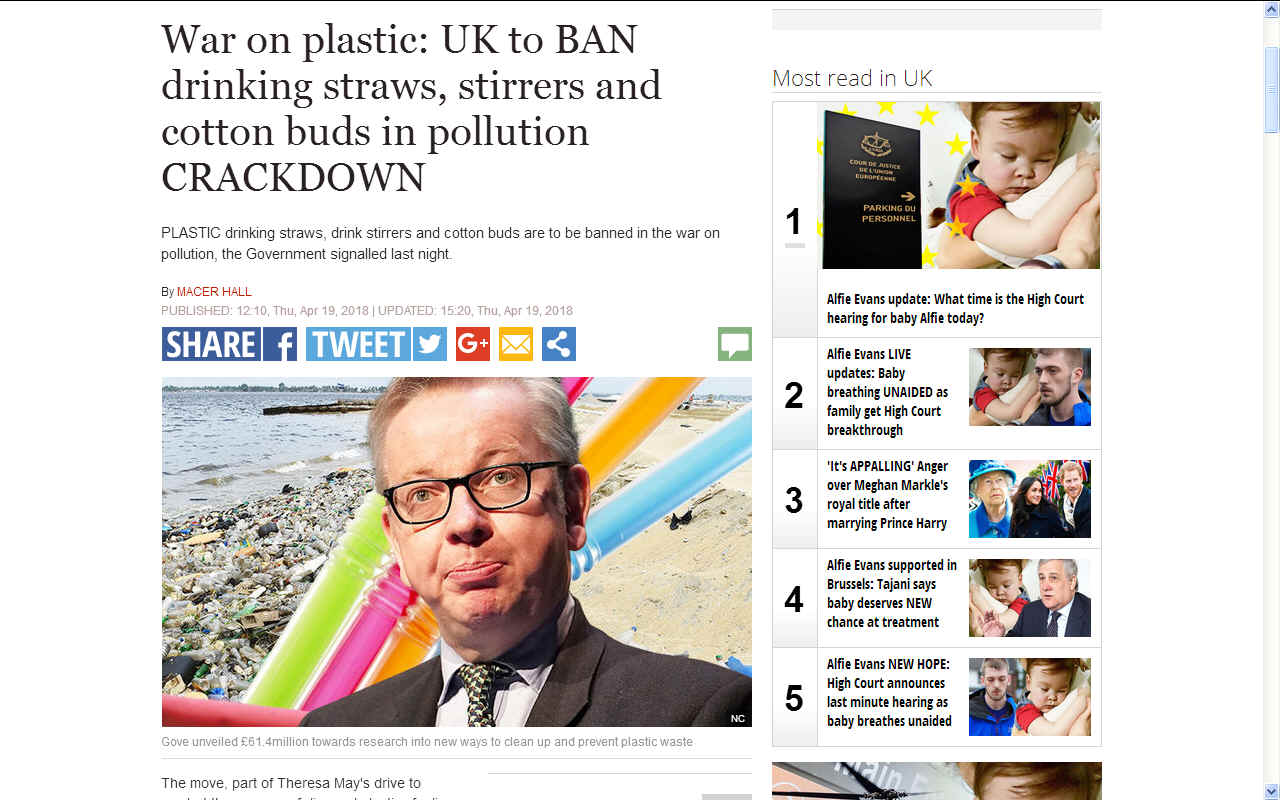
MONEY CONTROL
7 MAY 2018
The new International Union for Conservation of Nature (IUCN) co-authored analysis paper, released recently, warned that the 'plastic soup' contains toxic chemicals, which could pose risks to marine species and humans.
About eight million tonnes of plastic end up in the oceans each year and the global quantity will nearly double to 250 million tonnes by 2025, says a new analysis paper.
The new International Union for Conservation of Nature (IUCN) co-authored analysis paper, released recently, warned that the 'plastic soup' contains toxic chemicals, which could pose risks to marine species and humans.
It said reliable quantitative estimations of input loads, sources and originating sectors represent a significant knowledge gap, "but it is suggested that every year almost eight million tonnes leak to the ocean."
It said estimates are that oceans may already contain over 150 million tonnes of plastic, of which around 250,000 tonnes, fragmented into five trillion plastic pieces, may be floating at the oceans' surface.
"It has also been estimated that the global quantity of plastic in the ocean will nearly double to 250 million tonnes by 2025, which likely also represents a pollutant load of millions of tonnes of chemical additives," it said.
Marine species ingest potentially contaminated plastics directly, and by eating contaminated prey, says the paper titled 'Marine litter plastics and microplastics and their toxic chemicals components: the need for urgent preventive measures'.
"Seabirds are particularly vulnerable, with studies showing the presence of additives used as flame retardants in plastics, as well as foams and textiles, which were discovered in their stomachs and fatty tissue," said the paper, published in Environmental Sciences, Europe.
The paper said that at a global level, United Nations Environment Programme (UNEP) has estimated the economic impact of marine plastics (excluding microplastics), including losses incurred by fisheries and tourism due to plastic littering, as well as beach clean-up costs, at around USD 13 billion per year.
"Looking at the scale of the marine plastic problem today and at the projections for future growth in production of plastic globally, it is clear we are in the midst of a major crisis," said Carl Gustaf Lundin, Director of IUCNs Global Marine and Polar Programme.
Ludin said urgent action was needed to reduce toxic chemicals leaching into oceans from plastic. To reduce amount of contaminants in marine plastics, the authors recommend addressing issues in the life-cycle design of plastic products and creating products that minimise use of hazardous substances, an approach known as 'green chemistry'.
They also concluded that the development of best practice codes for industry is likely to be more efficient than relying on 'end-of-pipe' solutions; and existing scientific evidence and precautionary principles should drive action from scientists, industry, policy and civil society to curb leaking of plastics into the marine environment in the short term.
"Societies need to act at multiple levels," said Joao Sousa, IUCN Project Manager for Marine Plastics, co-author of the report. "Developed countries need to identify and adopt less harmful production processes and promote alternatives, whilst sound waste management and awareness-raising should be the main priority for developing nations," said Sousa.
The paper was authored by members of a working group associated with the Stockholm and Basel Conventions multilateral environmental agreements aimed at protecting human health and the environment from hazardous chemicals and wastes and other authors.
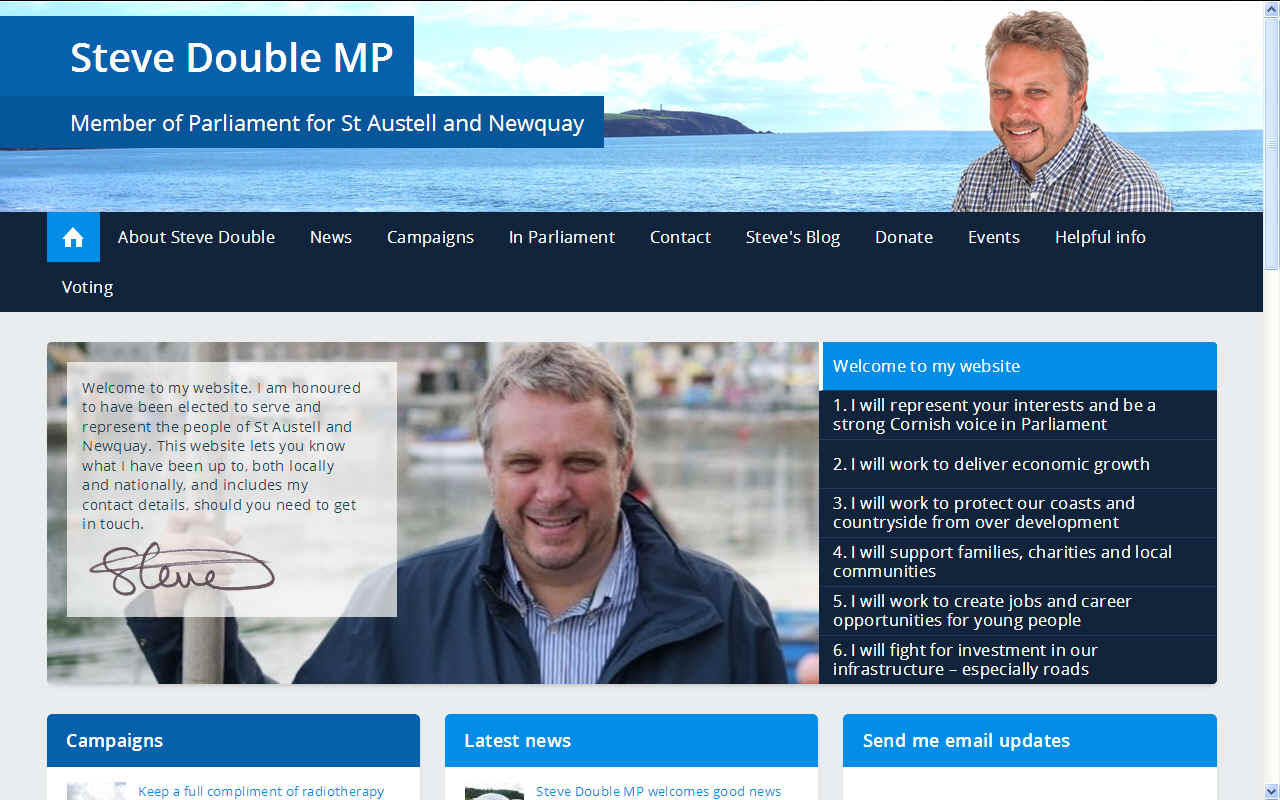
STEVE
DOUBLE MP FEBRUARY 2018
In
his capacity of Chairman of the Protect our Waves All Party
Parliamentary Group, working with Sky
TV, Steve Double hosted an event calling on MPs to pledge to
cut the amount of plastic used in Parliament with the aim of
making the UK the first plastic free Parliament.
Since his election in 2015 Mr Double has chaired the Protect
Our Waves APPG and along with the renowned campaigners at
Cornish charity Surfers Against Sewage have worked hard to
highlight the problems we are storing up for ours and future
generations with our reckless use of single
use plastics.
In 1950, the world’s population of 2.5 billion produced 1.5
million tons of plastic; in 2016, a global population of more
than 7 billion people produced over 320 million tons of
plastic. This is set to double by 2034. Every day
approximately 8 million pieces of plastic pollution find their
way into our oceans and there may now be around 5.25 trillion
macro and microplastic pieces floating in the open ocean,
altogether weighing up to 269,000 tonnes.
UK-wise, approximately 5000 items of marine plastic pollution
have been found per mile of beach and on average over 150
plastic bottles can be found on each mile of UK beaches.
On top of this, recent studies have revealed marine
plastic pollution in 100% of marine turtles,
59% of whales, 36% of seals and 40% of seabird species
examined. 100,000 marine mammals and turtles and 1 million sea
birds are killed by marine plastic pollution annually.
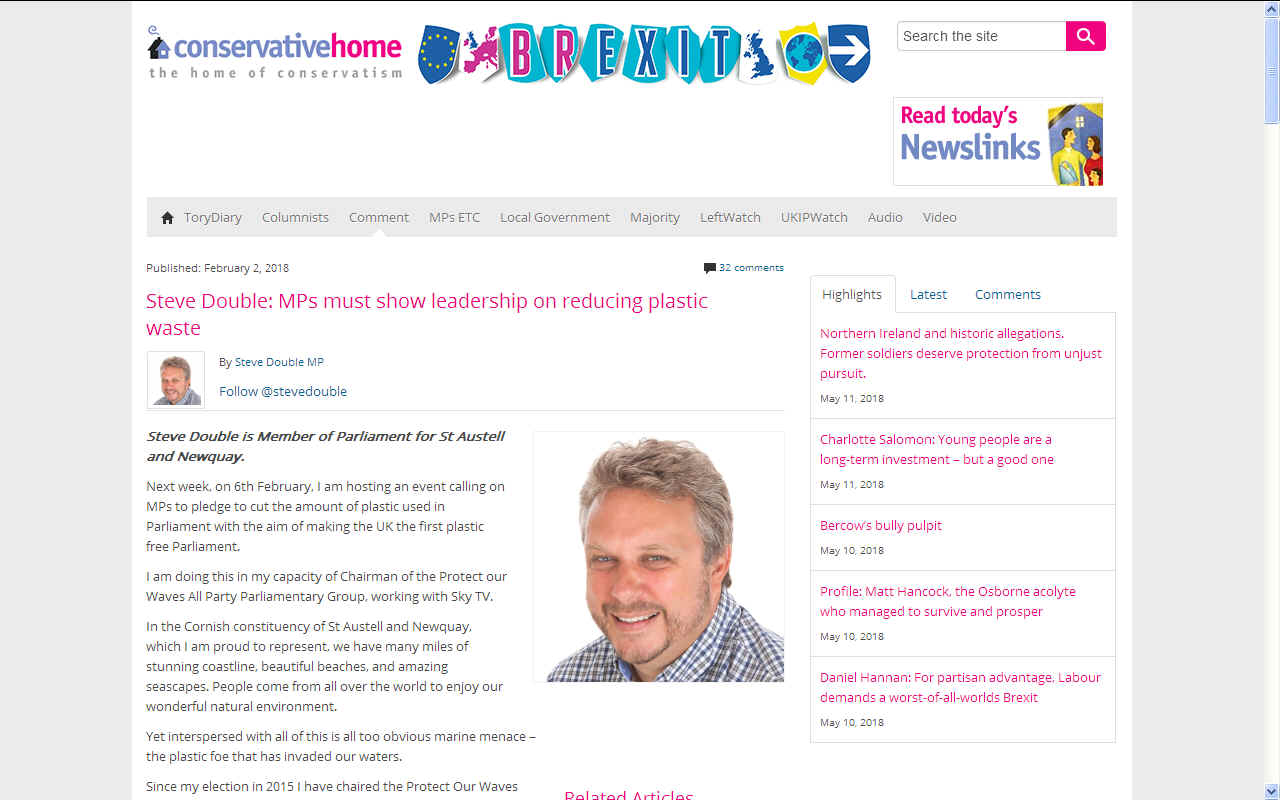
BREXIT
REPERCUSSIONS - Satellite research and contracts in the UK
are now in jeopardy as well as SeaVax losing out on potential
Horizon 2020 and European
and Maritime Fisheries Funding.
LINKS
& REFERENCE
https://www.express.co.uk/news/uk/948083/uk-news-plastic-pollution-britain-ban-drinking-straws-cotton-buds-stirrers-michael-gove
https://www.moneycontrol.com/news/india/global-quantity-of-plastic-in-oceans-to-nearly-double-to-250-mt-by-2025-2564313.html
https://www.edie.net/news/5/Michael-Gove-spearheads-MP-group-pledging-to-plastics-phase-out/
https://news.sky.com/story/sky-ocean-rescue-mps-to-make-plastics-pledge-to-tackle-pollution-11238464
Copyright © Cleaner
Oceans Foundation Ltd (COFL) (Company No: 4674774)
2018. Ocean
Suite, BN271RF, United Kingdom.
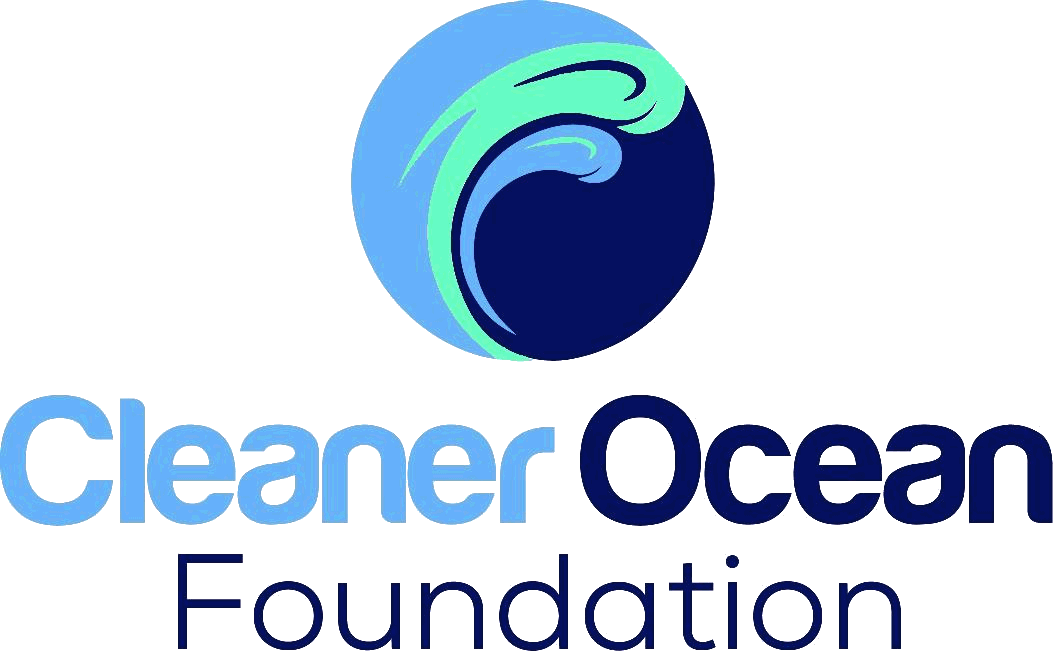
|





